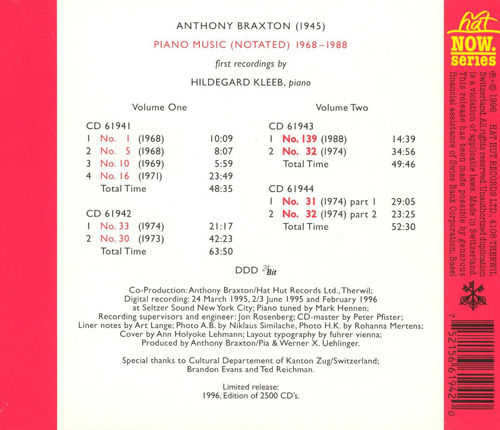 Recorded at the Institut fur Elektronische Musik und Akustik in Graz, Austria during the first week of August 2003, Anthony Braxton's (+ Duke Ellington) Concept of Freedom is a dazzling exercise in collective creativity. Braxton does not perform on this recording. Neither does Ellington, for that matter. Both men and their substantial accomplishments are honored and invoked by a quartet of skilled improvisers. These are trombonist Roland Dahinden, pianist Hildegard Kleeb, violinist Dimitris Polisoidis, and electronics artist Robert Holdrich. Kleeb, like her life partner Dahinden, has worked with Braxton's music in other contexts, most importantly perhaps her four-CD set devoted to 20 years' worth of his notated piano music which was released on the hatNOW series in 1996. The Braxtonian ingredients for the Concept of Freedom album combine his Ghost Trance Music Composition No. 257 with elements from Compositions 30, 31, 46, 69, 90 and 136. The Ellingtonian aspects were inspired by three different segments of "Freedom" from Duke's Second Concert of Sacred Music, which was presented in 1968 and posthumously released by Fantasy Records as a gatefold double LP. The bracing combination of minds and influences, patterns and evocations on this recording resulted in music of exceptionally inventive complexity and multi-dimensionality, as the full measure of perpetually evolving tradition was taken and expanded into precisely the kind of ritual function that Braxton has extolled and celebrated during virtually every day of his adult life. Finally, let's not overlook the other piece from Ellington's Second Sacred Concert that inspired an impassioned and creative instrumental: "Something ‘Bout Believing," done up joyously by Rahsaan Roland Kirk on his 1972 Atlantic album A Meeting of the Times. arwulf arwulf
Recorded at the Institut fur Elektronische Musik und Akustik in Graz, Austria during the first week of August 2003, Anthony Braxton's (+ Duke Ellington) Concept of Freedom is a dazzling exercise in collective creativity. Braxton does not perform on this recording. Neither does Ellington, for that matter. Both men and their substantial accomplishments are honored and invoked by a quartet of skilled improvisers. These are trombonist Roland Dahinden, pianist Hildegard Kleeb, violinist Dimitris Polisoidis, and electronics artist Robert Holdrich. Kleeb, like her life partner Dahinden, has worked with Braxton's music in other contexts, most importantly perhaps her four-CD set devoted to 20 years' worth of his notated piano music which was released on the hatNOW series in 1996. The Braxtonian ingredients for the Concept of Freedom album combine his Ghost Trance Music Composition No. 257 with elements from Compositions 30, 31, 46, 69, 90 and 136. The Ellingtonian aspects were inspired by three different segments of "Freedom" from Duke's Second Concert of Sacred Music, which was presented in 1968 and posthumously released by Fantasy Records as a gatefold double LP. The bracing combination of minds and influences, patterns and evocations on this recording resulted in music of exceptionally inventive complexity and multi-dimensionality, as the full measure of perpetually evolving tradition was taken and expanded into precisely the kind of ritual function that Braxton has extolled and celebrated during virtually every day of his adult life. Finally, let's not overlook the other piece from Ellington's Second Sacred Concert that inspired an impassioned and creative instrumental: "Something ‘Bout Believing," done up joyously by Rahsaan Roland Kirk on his 1972 Atlantic album A Meeting of the Times. arwulf arwulf
Tracklist :
1 Comp. No. 257 (+30, 31, 46, 69, 90 and 136)/Freedom No. 1, 4, And ... 9:58
Anthony Braxton / Duke Ellington
2 Comp. No. 257 (+30, 31, 46, 69, 90 and 136)/Freedom No. 1, 4, And ... 8:14
Anthony Braxton / Duke Ellington
3 Comp. No. 257 (+30, 31, 46, 69, 90 and 136)/Freedom No. 1, 4, And ... 8:27
Anthony Braxton / Duke Ellington
4 Comp. No. 257 (+30, 31, 46, 69, 90 and 136)/Freedom No. 1, 4, And ...
Anthony Braxton / Duke Ellington
5 Comp. No. 257 (+30, 31, 46, 69, 90 and 136)/Freedom No. 1, 4, And ... 4:10
Anthony Braxton / Duke Ellington
6 Comp. No. 257 (+30, 31, 46, 69, 90 and 136)/Freedom No. 1, 4, And ... 10:49
Anthony Braxton / Duke Ellington
7 Comp. No. 257 (+30, 31, 46, 69, 90 and 136)/Freedom No. 1, 4, And ... 11:04
Anthony Braxton / Duke Ellington
Credits :
Electronics – Robert Höldrich
Piano – Hildegard Kleeb
Trombone – Roland Dahinden
Violin – Dimitris Polisoidis








.jpg)







